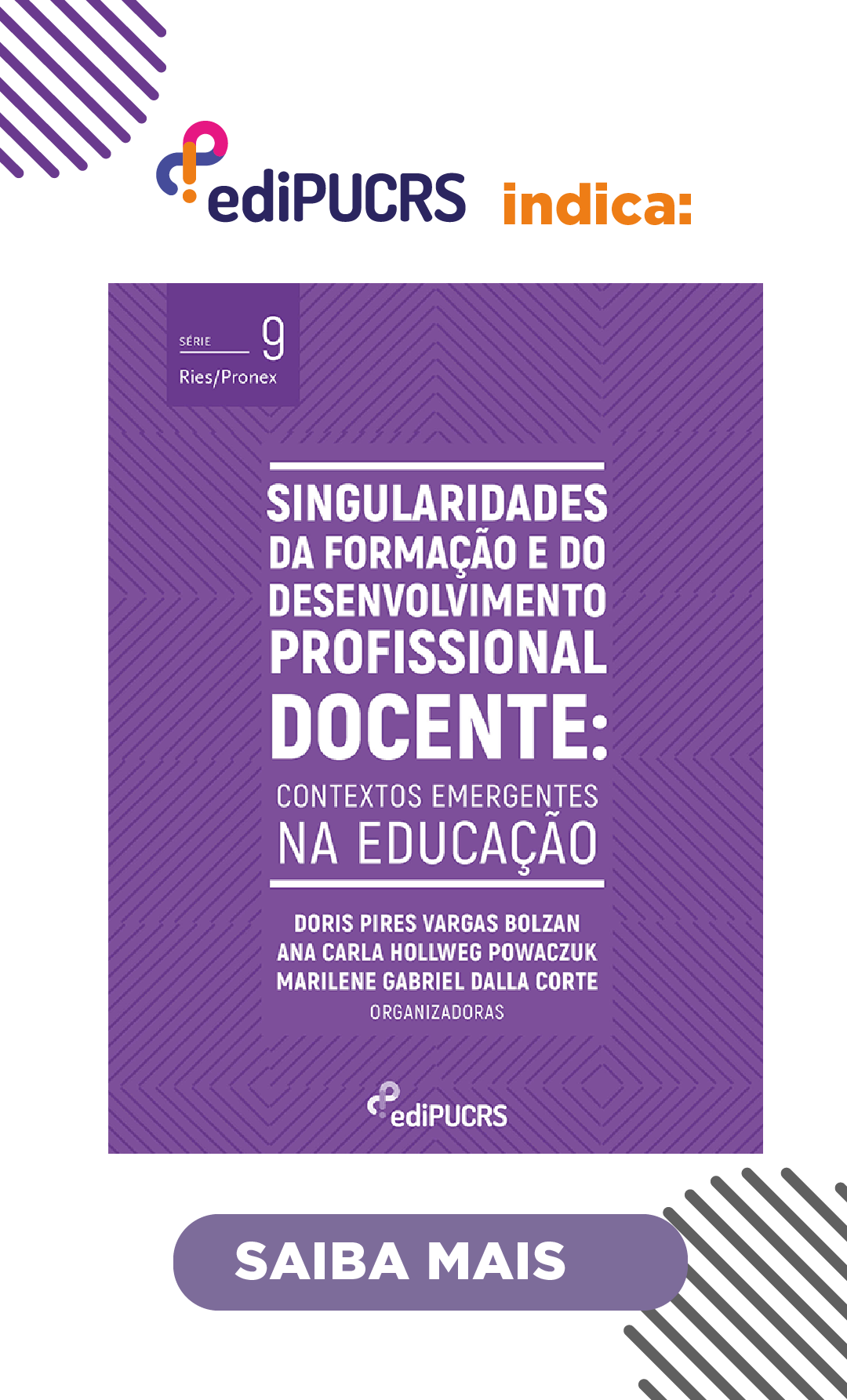Guide to Teaching Guidelines for tablets: tessitura of Instructional Design
DOI:
https://doi.org/10.15448/2179-8435.2015.2.19798Keywords:
Apps for Tablets. Instructional Design. Guide to Teaching Guidelines. Continuos Training of Teachers.Abstract
This article presents the results of a survey related to the selection of applications (programs/Apps) for tablets, which were incorporated into the guide didactic guidance in the light of the Instructional Design methodology. The study aimed to analyze the curriculum and official documents of the MEC to contemplate the use of mobile and ubiquitous technologies in order to support the processes of teaching and learning in Basic Education, taking into consideration the context of cyberculture. The research methodology involved a case study, using as instruments for data collection, questionnaires and participant observation. At the end the study was in evidence the understanding of the proposal implemented to use of tablets in education during the continuos training of teachers.
Downloads
References
BRASIL. Ministério da Educação. Secretaria de Educação Fundamental. Referencial Curricular Nacional para a Educação Infantil: Conhecendo o Mundo. v. 3. Brasília: MEC, 1998. Disponível em: http://portal.mec.gov.br/seb/arquivos/pdf/volume3.pdf - Acesso em mar. 2013.
BRASIL. Ministério da Educação. Secretaria de Educação Fundamental. Parâmetros Curriculares Nacionais: Língua Portuguesa. (3º e 4º ciclos do ensino fundamental). Brasília: MEC, 1998. Disponível em: http://portal.mec.gov.br/seb/arquivos/pdf/portugues.pdf - Acesso em mar. 2013.
BRASIL. Ministério da Educação. Secretaria de Educação Fundamental. Parâmetros Curriculares Nacionais: apresentação dos temas transversais. (3º e 4º ciclos do ensino fundamental). Brasília: MEC, 1998. Disponível em: http://portal.mec.gov.br/seb/arquivos/pdf/ttransversais.pdf - Acesso em mar. 2013.
BRASIL. Ministério da Educação. Secretaria de Educação Média e Tecnológica. Parâmetros Curriculares Nacionais (Ensino Médio). Brasília: MEC, 2009.
BRASIL. Ministério do Trabalho e Emprego. Classificação Brasileira de Ocupações. Disponível em: http://www.mtecbo.gov.br/cbosite/pages/pesquisas/BuscaPorTituloResultado.jsf - Acesso em abr. 2014.
CLEMENTINO, Adriana. O papel do planejamento pedagógico no Design instrucional de um curso a distância In: ABED, 2012. Disponível em: http://www.abed.org.br/congresso2012/anais/199c.pdf - Acesso em abr. 2014.
FILATRO, Andrea. Design instrucional contextualizado: educação e tecnologia. 2ª ed. São Paulo: Editora Senac, 2008.
FRANCO, L. R. H. R.; BRAGA, D. B.; RODRIGUES, A. EaD Virtual: entre a teoria e a prática. Porto Alegre: Premier, 2010.
GARCIA, Carlos Marcelo Formação de Professores – Para uma mudança educativa. Porto: Porto Editora, 1999.
GIRAFFA, L. M. M.; POOL, M. A. P. ESCOLA DIGITAL: entendendo o novo contexto. Porto Alegre: Editora UniRitter, 2013.
GADOTTI, Moacir; FREIRE, Paulo; GUIMARÃES, Sérgio. Pedagogia: diálogo e conflito. 8ª ed. São Paulo: Cortez, 2008.
GLOBO. Loja da Apps Google Play passa Apple Store em quantidade de aplicativos. Disponível em: http://g1.globo.com/tecnologia/noticia/2015/01/loja-da-Apps-google-play-passa-app-store-em-quantidade-de-aplicativos.html - Acesso em jan. de 2015.
KALSING, Janaína. Guia de aplicativos para smartphones e tablets será distribuído em escolas públicas de Porto Alegre. [Entrevista com Autora]. ZERO HORA, Porto Alegre, p. 32, 24 de mar. 2014. Disponível em: http://zerohora.clicrbs.com.br/rs/geral/noticia/2014/03/guia-de-aplicativos-para-smartphones-e-tablets-sera-distribuido-em-escolas-publicas-de-porto-alegre-4454870.html - Acesso em abr. 2014
KLEIMAN, Angela. Texto & Leitor: Aspectos Cognitivos da Leitura. Campinas: Pontes Editores, 2013.
MAYER, Richard. The Cambridge Handbook of Multimedia Learning. New York: Cambridge University Press, 2005. Disponível em: http://assets.cambridge.org/97805218/38733/excerpt/9780521838733_excerpt.pdf – Acesso em jan. 2015.
MINISTÉRIO DO TRABALHO E EMPREGO. Classificação Brasileira de Ocupações. Disponível em: http://www.mtecbo.gov.br/cbosite/pages/pesquisas/BuscaPorTituloResultado.jsf - Acesso em nov. 2014.
MINISTÉRIO DA EDUCAÇÃO. Fundo Nacional de Desenvolvimento da Educação. Programa Tablet Educacional. Disponível em: http://www.fnde.gov.br/tableteducacional/inicio - Acesso em mar. 2013.
MORAN, José. Tablets para todos conseguirão mudar a escola? Disponível em http://www2.eca.usp.br/moran/wp-content/uploads/2014/03/tablets.pdf - Acesso em abr. 2012.
NOGUEIRA, Mário. L. de L; BONATO, Nailda da M. C. Pesquisa em educação e projeto político pedagógico I, v.2, Rio de Janeiro, Fundação CECIERJ, 2003.
PALFREY, John. Nascidos na era digital: entendendo a primeira geração de nativos digitais. Tradução de: Magda França Lopes. Porto Alegre: Artmed, 2011.
PALMER, Parker J. A Coragem de Ensinar: explorando a paisagem interior da vida de um professor. Tradução de: Aline Storto Pereira. São Paulo: Da Boa Prosa, 2012. Ebook. Disponível na WWW:. ISBN 978-85-64684-21-8
SANTAELLA, Lucia. Linguagens líquidas na era da mobilidade. São Paulo: Paulus, 2007.
________________. Culturas e artes do pós-humano: Da cultura das mídias à cibercultura. São Paulo: Paulus, 2003.
VALLETTA, Debora. Cartilha Aplicativos Educativos. Porto Alegre: Colégio Farroupilha, 2014. Disponível em:
http://issuu.com/colegiofarroupilha/docs/cartilha_aplicativos_educativos_col - Acesso em abr. 2014.
VALLETTA, Debora. Gui@ de Aplicativos para Educação Básica: Uma investigação associada ao uso de tablets. In A Didática e a Prática de Ensino nas relações entre escola, formação de professores e sociedade, 12., 2014, Fortaleza. Anais. Fortaleza: XVII Encontro Nacional de Didática e Prática de Ensino da ENDIPE.
Downloads
Published
How to Cite
Issue
Section
License
Copyright
The submission of originals to Educação Por Escrito implies the transfer by the authors of the right for publication. Authors retain copyright and grant the journal right of first publication. If the authors wish to include the same data into another publication, they must cite Educação Por Escrito as the site of original publication.
Creative Commons License
Except where otherwise specified, material published in this journal is licensed under a Creative Commons Attribution 4.0 International license, which allows unrestricted use, distribution and reproduction in any medium, provided the original publication is correctly cited.





